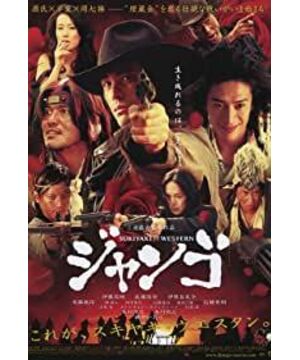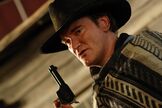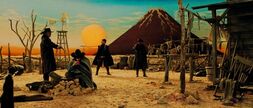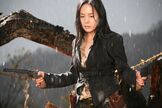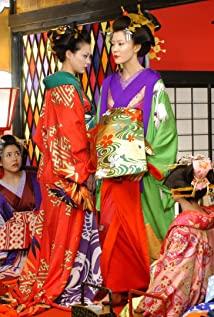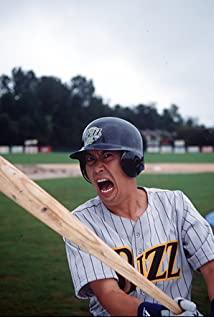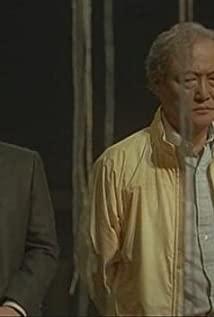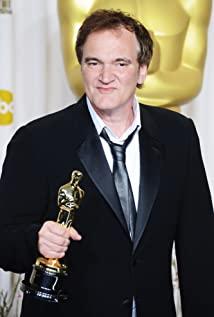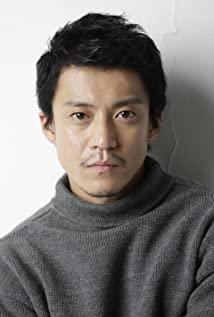Of course, this article is not a popular article. What's more, it's ridiculous that this film and "Sukiyaki" can't be compared at all. If there is something, Quentin vividly interprets the deliciousness of beef dipped in eggs for us at the beginning of the film. You read that right, this Quentin is that Tarantino. When the Cult king of the East, Takashi Miike, meets Quentin Tarantino, the godfather of Cult films in the West, you can imagine the vulgarity of the film.
This is also true. It is precisely because of the existence of these two great gods in the industry that it is difficult for the film to escape the path of "vulgar comedy". Most vulgar comedies mainly focus on entertainment and spoofs, and the style cannot be so elegant. It is not difficult to shoot, but it is not easy to shoot at a high-end atmosphere. Since Miike Takashi is known as the "Old Monster", there are three Shenshas that are indispensable. "Sukiyaki Western" mainly pays homage to and imitates two classic old films, one is Kurosawa Akira's "Heart Stick", and the other is Sergio Corbusi's "Django". The former is the lining, the latter is the coat. Of course, given the many similarities between the two films, even "Django" was originally inspired by "Heart Stick." Therefore, we can also regard this film as Miike Takashi's fusion and re-creation of "The Stick of the Heart" and "Django". It is worth mentioning that Quentin directed another masterpiece "Django Unchained" a few years later, which is a tribute to "Django". Maybe he was inspired by the three pools because of his participation in this film.
Takashi Miike racked his brains for this novelty, and the first magic sand he offered was "full English dialogue". Those who have been to Japan or have dealt with Japanese people know how unreliable Japanese English is. The world-renowned people who can redefine English pronunciation and have their own system are probably only Japanese and Indians. However, Miike Chongshi knew that there are tigers in the mountains and they tend to travel in the mountains, and the English dialogue from the beginning to the end does not bring any discount. What's even more rare is that the pronunciation of these actors is much more standard than the Japanese pronunciation in our impression. Among them, Kagawa Teruyuki, who has the lowest English level, has also made up for it, and his professionalism is evident.
His second Shensha is the introduction of Japan's famous "Genpei He War" into the story. The leaders of the two groups of gangsters who have appeared in the town are "Yoshitsune Yoshitsune" and "Ping Qingsheng". This setting not only arouses the strong interest of the audience familiar with Japanese history, but also contributes to an absurd artistic effect. , watching Japanese historical figures put on denim costumes, I feel like a time-travel drama in a trance. Especially when the opening poem of "Heike Monogatari" was repeated in English by the cowboy, the historical symphony of "The bell of the Gion Jingya plays the impermanent sound of all things. The heavy and serious sense instantly melted away.
This is not the end, Miike's third Shensha sacrificed a "hodgepodge of ancient and modern weapons". The sword meets the revolver, the crossbow meets the shotgun, and there is even an invincible Gatling gun (the stalk of the machine gun in the coffin comes from "Django"). This combination makes the movie come back from the absurdity, because the confrontation between cold weapons and hot weapons still occurs today. Hot weapons have the upper hand in lethality and speed, but cold weapons obviously have unparalleled chilling and special charm. Gen Yoshitsune finally slowly drew out the tachi to confront the protagonist's gunman, which is definitely much more fanciful than Qingsheng Ping, who was shaking Gatling and pouring bullets. Since it is an old monster movie, since it wants to show Japanese elements, how can it be done without a bit of force?
Throughout the three Shenshas of Takashi Miike, the core key word is to mix things up, whether it is Japanese actors who speak English throughout the whole process, or wearing cowboy outfits on the Genpei family, or using Japanese knives Fighting against muskets relies on the contrast between the East and the West to generate absurdity and alienation, which minimizes the familiar flavor of traditional sword and halberd films or Western films, thus producing a different kind of comedy element. At the same time, we can also see that in addition to adding Western elements, Miike still retains many unique Japanese comedy methods, such as exaggerated, dramatic body movements and difficult narration, which can greatly stimulate the imagination of the audience.
Finally, those who love Japanese enko master Saburo Kitajima must not miss the Japanese version of "Django" sung by him at the end of the film. This song may be equivalent to the bowl of egg liquid in sukiyaki in the film, neutralizing the front. Those spoofs and nonsense are the perfect finishing touch.
View more about Sukiyaki Western Django reviews


